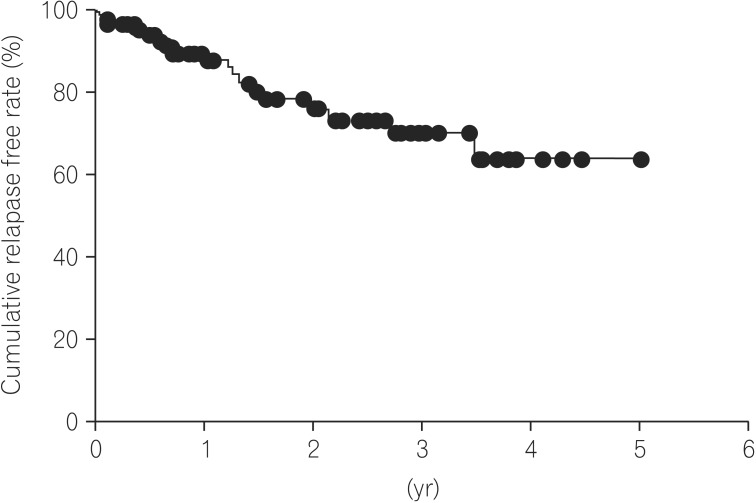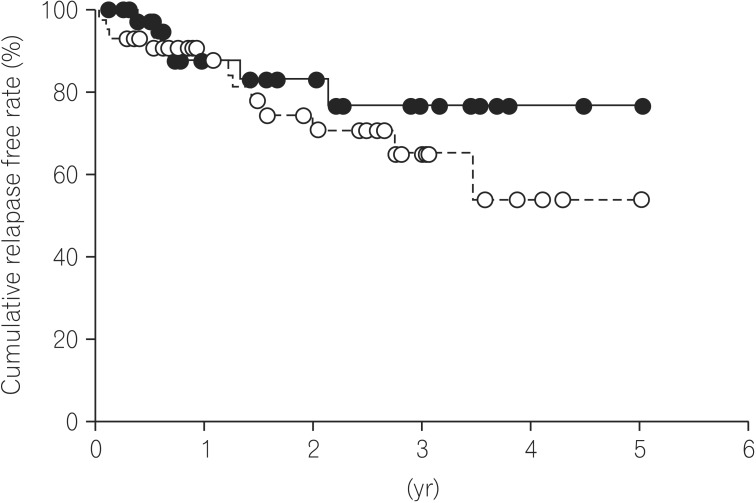Intest Res.
2016 Jan;14(1):37-42. 10.5217/ir.2016.14.1.37.
The predictive variable regarding relapse in patients with ulcerative colitis after achieving endoscopic mucosal healing
- Affiliations
-
- 1Division of Gastroenterology and Hepatology, Digestive Disease Center, Kitano Hospital, Osaka, Japan. s-yazumi@kitano-hp.or.jp
- KMID: 2174508
- DOI: http://doi.org/10.5217/ir.2016.14.1.37
Abstract
- BACKGROUND/AIMS
Mucosal healing (MH) is a proposed therapeutic goal for patients with ulcerative colitis (UC). Whether MH is the final goal for UC, however, remains under debate. Therefore, to elucidate clinical variables predicting relapse after MH in UC could be useful for establishing further therapeutic strategy. The aim of this study is to evaluate the predictive variables for relapse in UC-patients after achieving MH.
METHODS
From April 2010 to February 2015, 298 UC-patients treated at Kitano Hospital were retrospectively analyzed. MH was defined as Mayo endoscopic subscore of 0 or 1. The cumulative relapse free rate after achieving MH was evaluated. Predictive variables for relapse in UC-patients were assessed by Cox regression analysis.
RESULTS
Of 298 UC-patients, 88 (29.5%) achieved MH. Of the 88 UC patients who achieved MH, 21 (23.9%) experienced UC-relapse. Based on Kaplan-Meier analysis, the cumulative relapse free rate at 1, 3, and 5 years after achieving MH was 87.9%, 70.2%, and 63.8%, respectively. The cumulative relapse free rate tended to be higher in the Mayo-0 group (76.9%) than in the Mayo-1 group (54.1%) at 5 years, although the difference was not statistically significant (P=0.313). Cox regression analysis indicated that the use of an immunomodulator was a predictive variable for relapse in UC-patients after achieving MH (P=0.035).
CONCLUSIONS
Our data demonstrated that the prognosis of UC patients after achieving endoscopic MH could be based on UC refractoriness requiring an immunomodulator.
Keyword
MeSH Terms
Figure
Cited by 1 articles
-
Predictive factors for achievement of mucosal healing by budesonide 2-mg foam in ulcerative colitis: a pooled analysis of data from two clinical trials
Toshifumi Hibi, Makoto Naganuma, Eisei Oda, Yoji Yamada, Yoshitomo Chujoh, Ryoichi Yoshihara, Mamoru Watanabe
Intest Res. 2020;18(1):56-68. doi: 10.5217/ir.2019.00064.
Reference
-
1. Hanauer SB. Inflammatory bowel disease: epidemiology, pathogenesis, and therapeutic opportunities. Inflamm Bowel Dis. 2006; 12(Suppl 1):S3–S9. PMID: 16378007.
Article2. Hanauer S, Schwartz J, Robinson M, et al. Mesalamine capsules for treatment of active ulcerative colitis: results of a controlled trial. Pentasa Study Group. Am J Gastroenterol. 1993; 88:1188–1197. PMID: 8338086.3. Baron JH, Connell AM, Kanaghinis TG, Lennard-Jones JE, Jones AF. Out-patient treatment of ulcerative colitis. Comparison between three doses of oral prednisone. Br Med J. 1962; 2:441–443. PMID: 13865152.4. Truelove SC, Witts LJ. Cortisone and corticotrophin in ulcerative colitis. Br Med J. 1959; 1:387–394. PMID: 13618646.
Article5. Rutgeerts P, Sandborn WJ, Feagan BG, et al. Infliximab for induction and maintenance therapy for ulcerative colitis. N Engl J Med. 2005; 353:2462–2476. PMID: 16339095.
Article6. Yamamoto S, Nakase H, Mikami S, et al. Long-term effect of tacrolimus therapy in patients with refractory ulcerative colitis. Aliment Pharmacol Ther. 2008; 28:589–597. PMID: 18549460.
Article7. Colombel JF, Rutgeerts P, Reinisch W, et al. Early mucosal healing with infliximab is associated with improved longterm clinical outcomes in ulcerative colitis. Gastroenterology. 2011; 141:1194–1201. PMID: 21723220.
Article8. Yokoyama K, Kobayashi K, Mukae M, Sada M, Koizumi W. Clinical study of the relation between mucosal healing and longterm outcomes in ulcerative colitis. Gastroenterol Res Pract. 2013; 2013:192794. DOI: 10.1155/2013/192794. PMID: 23762033.
Article9. Höie O, Wolters F, Riis L, et al. Ulcerative colitis: patient characteristics may predict 10-yr disease recurrence in a European-wide population-based cohort. Am J Gastroenterol. 2007; 102:1692–1701. PMID: 17555460.
Article10. Dignass A, Eliakim R, Magro F, et al. Second European evidence-based consensus on the diagnosis and management of ulcerative colitis part 1: definitions and diagnosis. J Crohns Colitis. 2012; 6:965–990. PMID: 23040452.
Article11. D'Haens G, Sandborn WJ, Feagan BG, et al. A review of activity indices and efficacy end points for clinical trials of medical therapy in adults with ulcerative colitis. Gastroenterology. 2007; 132:763–786. PMID: 17258735.12. Wright R, Truelove SR. Serial rectal biopsy in ulcerative colitis during the course of a controlled therapeutic trial of various diets. Am J Dig Dis. 1966; 11:847–857. PMID: 5953695.13. Ikeya K, Sugimoto K, Kawasaki S, et al. Tacrolimus for remission induction in ulcerative colitis: Mayo endoscopic subscore 0 and 1 predict long-term prognosis. Dig Liver Dis. 2015; 47:365–371. PMID: 25682993.14. Barreiro-de Acosta M, Vallejo N, de la Iglesia D, et al. Evaluation of the risk of relapse in ulcerative colitis according to the degree of mucosal healing (Mayo 0 vs 1): a longitudinal cohort study [published online ahead of print September 8, 2015]. J Crohns Colitis. 2015; DOI: 10.1093/ecco-jcc/jjv158.15. Neurath MF, Travis SP. Mucosal healing in inflammatory bowel diseases: a systematic review. Gut. 2012; 61:1619–1635. PMID: 22842618.16. Bitton A, Peppercorn MA, Antonioli DA, et al. Clinical, biological, and histologic parameters as predictors of relapse in ulcerative colitis. Gastroenterology. 2001; 120:13–20. PMID: 11208709.17. Bessissow T, Lemmens B, Ferrante M, et al. Prognostic value of serologic and histologic markers on clinical relapse in ulcerative colitis patients with mucosal healing. Am J Gastroenterol. 2012; 107:1684–1692. PMID: 23147523.
Article18. Macé V, Ahluwalia A, Coron E, et al. Confocal laser endomicroscopy: a new gold standard for the assessment of mucosal healing in ulcerative colitis. J Gastroenterol Hepatol. 2015; 30(Suppl 1):85–92. PMID: 25827810.
Article19. Bryant RV, Burger DC, Delo J, et al. Beyond endoscopic mucosal healing in UC: histological remission better predicts corticosteroid use and hospitalisation over 6 years of follow-up [published online ahead of print May 18, 2015]. Gut. 2015; DOI: 10.1136/gutjnl-2015-309598.
- Full Text Links
- Actions
-
Cited
- CITED
-
- Close
- Share
- Similar articles
-
- The evolving understanding of histology as an endpoint in ulcerative colitis
- Can histologic remission be a better prognostic factor and therapeutic target beyond endoscopic mucosal healing in patients with ulcerative colitis?
- An Elevated Platelet Count Increases the Risk of Relapse in Ulcerative Colitis Patients with Mucosal Healing
- Histologic healing and clinical outcomes in ulcerative colitis
- Beyond mucosal healing: fecal calprotectin and the path toward histologic remission in ulcerative colitis



